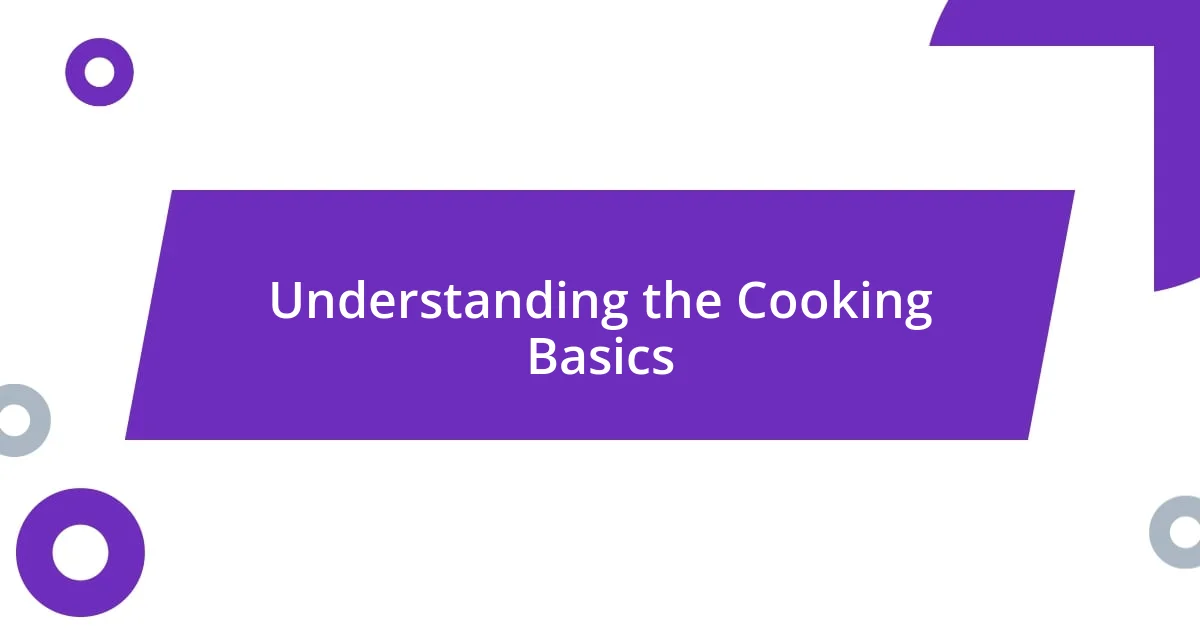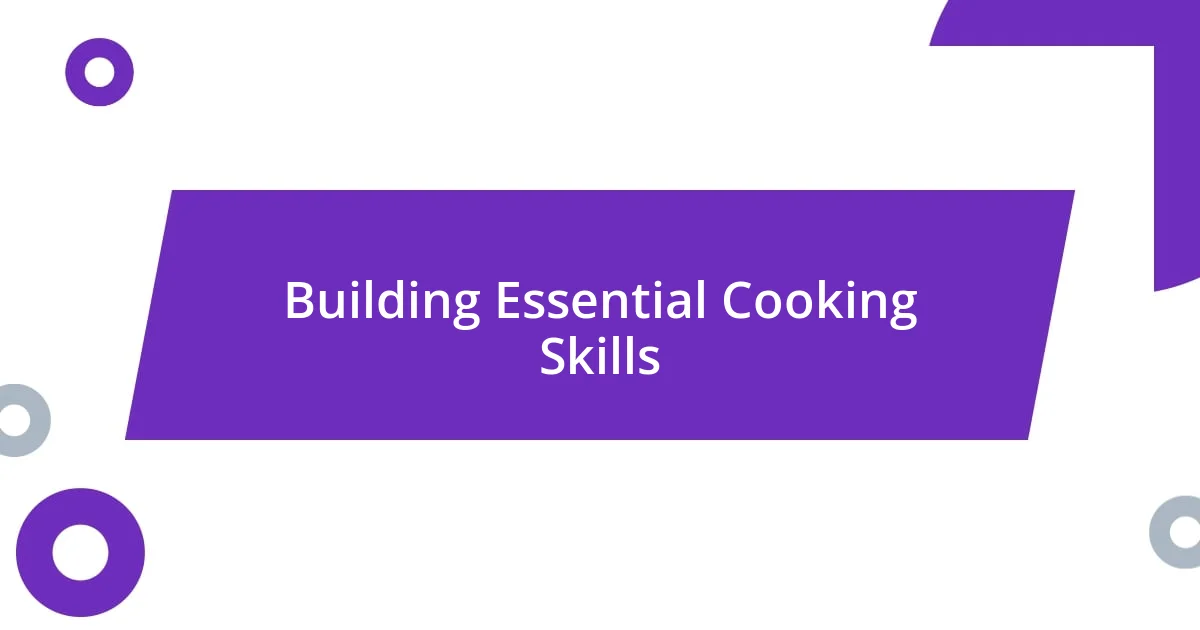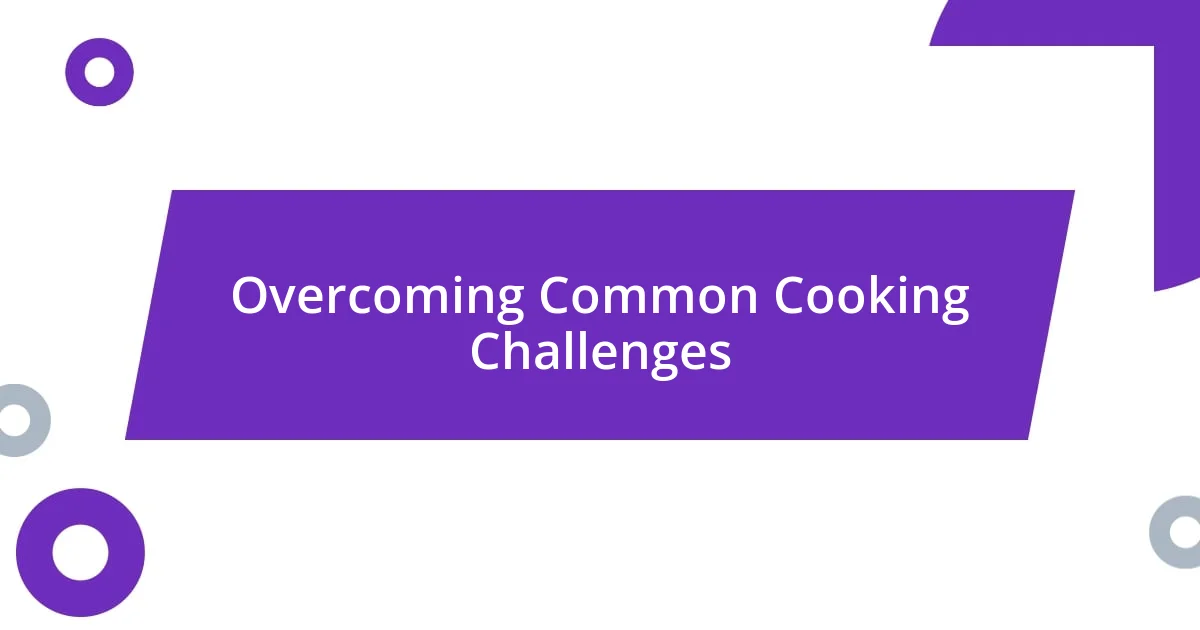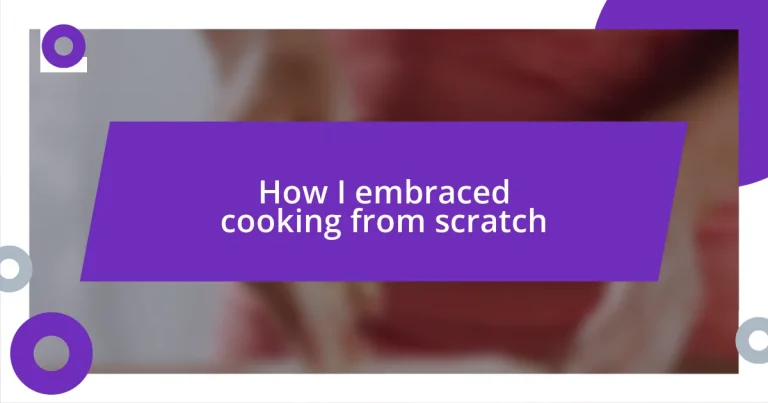Key takeaways:
- Understanding the fundamentals of cooking, including techniques and precise measurements, enhances both skill and confidence in the kitchen.
- Discovering fresh ingredients and sourcing locally fosters a deeper appreciation for food quality and cultivates a creative cooking environment.
- Embracing flexibility, experimentation, and learning from mistakes can transform cooking into a joyful and expressive experience.

Understanding the Cooking Basics
Understanding the basics of cooking is like learning a new language. When I first peeled an onion for my mom’s famous dish, I remember the way my eyes watered, but also the warmth of her laughter as she shared tips on not just chopping but appreciating each layer of flavor. Isn’t it fascinating how this simple act can evoke such vivid memories and emotions?
What I’ve learned over the years is that every technique has a purpose. For instance, understanding how to properly sear meat not only creates a beautiful crust but locks in those juices, elevating a meal from ordinary to extraordinary. Have you ever tasted a perfectly cooked steak? That rich, buttery texture is hard to forget.
Measuring ingredients may seem mundane, but it’s the foundation of good cooking. I recall my first attempt at baking; without precise measurements, I ended up with a pancake flat as a Frisbee. It was both humorous and frustrating! How often do we take precision for granted? Mastering these cooking basics not only boosts our confidence but invites us to experiment freely in the kitchen.

Discovering Fresh Ingredients
Discovering fresh ingredients has become one of my favorite aspects of cooking from scratch. I vividly remember the first time I wandered through a local farmer’s market, the air filled with earthy aromas and vibrant colors. Picking up a ripe heirloom tomato, I was struck by its unique shape and deep red hue. That tomato turned into a simple salad that tasted like sunshine, and it dawned on me that the quality of ingredients directly influences the final dish. Have you ever experienced the joy of biting into something so fresh that it transports you?
As I dove deeper into this culinary journey, I realized that sourcing ingredients is akin to unearthing hidden treasures. I began to connect with local farmers and learned about seasonal produce. One particularly memorable moment was when I attended a farm tour, and I discovered how much care goes into growing vegetables. Seeing the rows of earthy carrots still speckled with dirt made me appreciate the effort behind my food. There’s something so grounding about knowing where your food comes from and how it’s nurtured.
Exploring fresh herbs opened a whole new world of flavors for me. My kitchen now boasts pots of basil, cilantro, and rosemary that I nurture and snip for various dishes. One evening, I grabbed fresh basil straight from my windowsill while preparing homemade pesto. The aroma was intoxicating, and the taste was a revelation! Fresh ingredients have elevated not just my meals, but my entire cooking experience.
| Fresh Ingredients | Store-Bought Ingredients |
|---|---|
| Vibrant flavors and aromas | Often bland and lacking freshness |
| Supports local farmers | Generic, mass-produced items |
| Inspires creativity and experimentation | Limited sense of culinary adventure |

Planning Weekly Meals Efficiently
Planning meals for the week has become a transformative practice in my cooking journey. I used to scramble at the last minute, unsure of what to prepare, which often led to takeout pizza nights—while convenient, they fell flat on satisfaction. Now, I set aside time each Sunday to sketch out a menu. It feels like curating a mini culinary adventure, giving me something to look forward to each day.
Here are some tips that have helped me streamline my planning:
- Select a Theme: Designate thematic nights (Taco Tuesday, Stir-Fry Friday) to guide your choices.
- Keep It Balanced: Aim for a mix of proteins, veggies, and grains throughout the week for nutritional diversity.
- Prep Ahead: Chop vegetables or marinate proteins ahead of time to save time during busy weekdays.
- Utilize Leftovers: Intentionally cook extra portions to incorporate into the next day’s meals, reducing food waste and effort.
- Stay Flexible: Allow for a fun twist—maybe a “leftover night” or an unexpected new recipe to keep things interesting.
The process has become a ritual that not only organizes my week but also stirs excitement. I remember a night when my daughter and I decided to whip up a surprise dessert for dinner. We gathered our leftover fruits, a bit of yogurt, and created a delicious parfait together—laughing and chatting. Cooking from a plan not only nourishes our bodies but lends itself to these spontaneous moments that become memories. It truly intertwines family time with creativity, making the kitchen the heart of our home.

Building Essential Cooking Skills
Building essential cooking skills is a rewarding journey that grows with each dish prepared. I remember the first time I sharpened my knife correctly; it felt like magic had happened. Cutting through vegetables became smoother, and with practice, my knife skills improved, opening the door to the joy of prepping ingredients. How many times have you struggled with chopping? Trust me, it’s worth investing the time to learn the right techniques.
I’ve also found that mastering the basics of cooking techniques—like sautéing, roasting, or boiling—has been incredibly empowering. Each technique has a unique charm to it. When I first learned to sauté garlic, the aroma filled my kitchen, wrapping me in warmth and anticipation. It was like the gateway to a new flavor dimension in all my dishes. It made me ponder: what simple technique could transform your meals?
To make it even more fun, I started experimenting with different seasonings. In one memorable attempt, I added fresh ginger and turmeric to a stir-fry. The result? A burst of flavor that had my taste buds dancing! It’s moments like these that remind me how cooking is a continuous learning process, full of delightful surprises that invite creativity. Embrace the skills as they come, and you’ll find cooking can become not just a chore but a form of self-expression.

Experimenting with Flavor Combinations
Experimenting with flavor combinations has turned my kitchen into a creative playground. One evening, I decided to mix sweet and savory by adding a touch of maple syrup to my roasted Brussels sprouts. The result was a delightful balance I never expected, and it made me think: how often do we shy away from unusual pairings? Embracing bold flavor combinations can genuinely elevate your dishes, inviting new experiences with each bite.
I often find myself wandering through spice aisles, curious about what each bottle could bring to my cooking. Recently, I stumbled upon smoked paprika, and it inspired me to use it in a classic potato salad. The subtle smokiness transformed the dish into something far more intriguing. A simple spice can change everything—what unexpected ingredients might you have in your pantry that could breathe new life into your meals?
Through these culinary adventures, I’ve learned that flavor experimentation is as much about intuition as it is about recipes. A few weeks back, I tossed together some leftover roasted chicken with a handful of fresh mint and a squeeze of lime. The freshness contrasted beautifully with the richness of the chicken, ultimately reminding me of the importance of trusting my instincts in the kitchen. What flavors resonate with you? Taste is a personal journey, and allowing yourself the freedom to explore makes cooking truly rewarding.

Overcoming Common Cooking Challenges
I’ve encountered my fair share of cooking challenges, and one of the most daunting was managing time effectively. Initially, I’d often find myself rushing the cooking process, which led to undercooked meals or chaos in the kitchen. However, I learned the value of meal prepping. Now, I dedicate a Sunday evening to chop vegetables and marinate proteins, making weeknight cooking a breeze. Have you ever felt the pressure of dinner time creeping up on you? Trust me, taking just a little time to plan can transform your culinary experience.
Another hurdle I faced was the fear of making mistakes. Early in my cooking journey, I was obsessed with following recipes to the letter. One evening, I accidentally burnt a sauce by getting distracted. Instead of giving up, I decided to adapt. I salvaged it by incorporating cream and herbs, ending up with a surprisingly delightful dish. Wouldn’t it be freeing to embrace mistakes as learning opportunities rather than setbacks? I’ve discovered that a little improvisation often leads to unexpectedly delicious results.
Ingredient substitutions also posed challenges for me. I remember preparing a dish only to find I was short on a key ingredient. Instead of panic, I experimented with what I had—applesauce instead of oil in baked goods. To my surprise, it added moisture and a subtly sweet flavor. How often do we let a missing ingredient derail our plans? I urge you to embrace flexibility; cooking should be about creativity and resourcefulness, not just sticking rigidly to a list.














